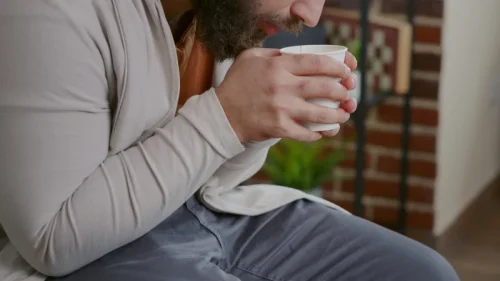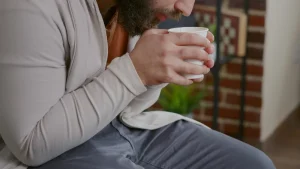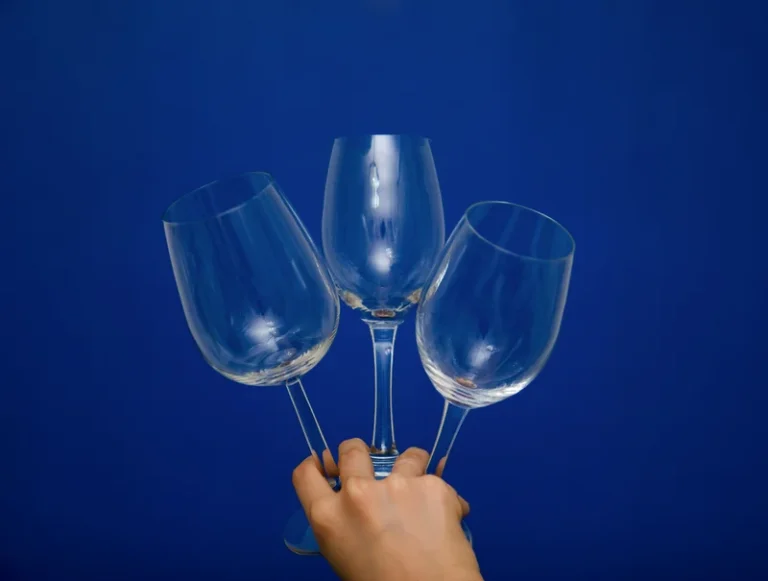
Below we provide a review of the empirical support for several of the most common sleep hygiene recommendations including caffeine consumption, smoking, alcohol use, exercise, stress, noise, sleep timing, and daytime napping. To date, only a few studies have directly tested the efficacy of this recommendation by assigning individuals to adopt a regular sleep schedule and observing the effects on subsequent sleep. In contrast, Manber and colleagues recruited 39 college students who reported both irregular sleep schedules and excessive daytime sleepiness.111 Participants assigned to a 4-week regular sleep-wake schedule reported significantly decreased daytime sleepiness compared with controls. Authors also noted decreased SOL and increased SE from baseline to post-intervention, but these changes were not significantly different between groups. In sum, for non-dependent individuals, occasional consumption of alcohol (even light amounts) shortly before bedtime can impair sleep that night. The impact of afternoon or early evening alcohol use on sleep is not yet clearly understood.
Alprazolam forms

Less is known regarding scientifically valid strategies by which the average person might effectively improve their sleep. Relatively few studies have investigated the efficacy of sleep hygiene interventions in nonclinical samples.16-20 Overall, this work has provided some preliminary support for the use of sleep hygiene education in nonclinical populations, but the findings are inconsistent. Taken together with findings in clinical samples, these data raise an interesting question. Inconsistent and uncompelling findings may be due, in large part, to the lack of a standardized approach in the application of sleep hygiene principles to clinical practice and research.
Empirical support for individual sleep hygiene recommendations
Understanding how alcohol affects sleep can help does alcohol help you sleep you enhance your sleep quality and may potentially lead you to make different choices before bed. Alcohol can help people feel more relaxed and sleepy, but it’s also linked to poor sleep quality and duration, according to the Sleep Foundation, a U.S. nonprofit organization. Generally, the more a person drinks, the more their sleep quality suffers.
Health Challenges
Please note, we cannot provide specific medical advice, and always recommend you contact your doctor for any medical matters. Founded in 2014, this site is dedicated to bringing you the most comprehensive sleep-industry information on the web. Head over to https://ecosoberhouse.com/article/how-to-build-alcohol-tolerance-improve-your-alcohol-tolerance-now/ our About page to learn more about the team behind Sleepopolis.
- First, the field would benefit from studies of sleep hygiene recommendations that are applicable to natural behavior patterns.
- The compensation we receive from advertisers does not influence the recommendations or advice our editorial team provides in our articles or otherwise impact any of the editorial content on Forbes Health.
- So while alcohol is being processed, before you begin to feel a bit drowsy, the calories are being converted to energy.
- These sleep-related breathing difficulties occur when soft tissues collapse and block the upper airway.
Regular use of alcohol and nicotine also results in tolerance and dependence, which may moderate their effects on sleep. Thus, different recommendations that take into account the sleep-disrupting effects of substance withdrawal might be needed for dependent and nondependent users of these substances. Future research investigating the impact of naturalistic behavior patterns on sleep will help develop sleep hygiene recommendations that are applicable and appropriate for a broader audience. In sum, the evidence demonstrates a clear association between sleep schedule irregularity and sleep problems, though the data in nonclinical samples are somewhat limited by their self-report nature. Research investigating the impact of changing from an irregular to a regular sleep schedule may not generalize to the population most likely to use sleep hygiene recommendations because the participants did not have any sleep complaints.


Specifically, we performed a selective review of research investigating the impact of caffeine use, smoking, alcohol use, exercise, stress management, noise, sleep timing, and napping on nocturnal sleep characteristics. Epidemiologic and laboratory research provide some support for the relationships between individual sleep hygiene components and sleep, and each recommendation is supported by plausible physiological and psychosocial mechanisms. However, the present review identified several critical gaps in the current evidence for the use of sleep hygiene recommendations in the general population. First, direct evaluation of the effects of following sleep hygiene recommendations is scant and inconclusive for many individual recommendations. Such data are necessary to validate the extrapolation from sleep disruption studies (e.g., does administering caffeine result in impaired sleep?) to sleep hygiene recommendations (e.g., does abstaining from caffeine result in improved sleep?).
- But when alcohol is consumed a few hours before tucking in between the sheets, it can be even more challenging to return to sleep.
- Sunnyside uses a psychology-based approach to help you drink more mindfully, no matter what your goal is.
- One of the most important steps is to reduce how much alcohol you drink in a given timeframe.
- As a passionate advocate for science-based content, she loves writing captivating material that supports scientific research and education.
- Research shows that regular alcohol intake can reduce sleep quality over time, potentially causing issues such as insomnia.
What is alcohol’s impact on circadian rhythms and REM sleep?
Reducing your alcohol intake, especially in the hours leading up to your bedtime, can help you wake up well-rested and energized in the morning. In addition, since poor sleep can negatively affect one’s health, the benefits of a restful night go beyond feeling alert in the morning. “Typically, it’s advised to stop drinking alcohol around three to four hours before bed. This should give the body enough time to metabolize the alcohol and get it out of one’s system, allowing them to enjoy unaffected sleep,” explains Dr. Hsu. This provides enough room to enjoy an after-work cocktail with friends, indulge in a glass of wine at your favorite restaurant, and crack open a beer after a weekend’s worth of chores around the house—all without interfering with healthy sleep and circadian rhythms.
- Alcohol has a direct effect on circadian rhythms, diminishing the ability of the master biological clock to respond to the light cues that keep it in sync.
- Thus, the effectiveness of this sleep hygiene recommendation for alcohol-dependent individuals is not well known.
- For most people, alcohol induces a deeper-than-usual sleep in the first half of the night, followed by disrupted sleep in the second half of the night.
- There are a few things you can do to improve your sleep quality even when drinking alcohol is part of your routine, says Dr. Oyegbile-Chidi.

You can check RISE for a personalized time to stop drinking alcohol based on your daily circadian rhythm, the internal clock that dictates your sleep cycle. If alcohol continues to disrupt your overall sleep quality, you may consider cutting it out entirely, or limiting your intake before bedtime. If you’ve stopped drinking alcohol, but are still having sleep issues, be sure to reach out to a sleep specialist. It is recommended that alcohol not be consumed in the last four hours before bedtime.

Leave a Reply